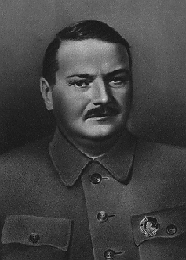German Chief of Staff at OKH from 1942 to 1944, had distinguished himself by his effective logistical planning for the Western Offensive in 1940 and was credited by Hitler wit repelling the Anglo-Canadian Dieppe Raid; in September 1942, when Hitler dismissed Halder over his criticism of the Stalingrad campaign, was promoted over the heads of more senior officers to replace Halder as Chief of the General Staff; was instrumental in persuading Hitler to launch the offensive against Kursk in the summer of 1943, but, following its failure, was no longer involved in the initiation of operations; progressively adopted a novel form of resistance to Hitler's military planning by reporting himself unwell and ceasing to carry out his duties; dismissed from the army in July 1944, after several unsuccessful attempts to resign, survived the war.

joined the Bolsheviks in 1915 and rose through the party ranks, becoming the party leader in Leningrad after the assassination of Sergei Kirov in 1934; was a strong supporter of socialist realism in art; in June, 1940, was sent to Soviet occupied Estonia[3] to supervise establishment of puppet government and incorporation of country into USSR; during the Great Patriotic War was in charge of the defense of Leningrad; after the cease-fire agreement between Finland and the Soviet Union was signed in Moscow on September 4, 1944, headed the Allied Control Commission in Finland until the Paris peace treaty of 1947; in 1946, was put in charge of the Soviet Union cultural policy by Josef Stalin. His first action (in December 1946) was to abuse independent Russian writers such as Anna Akhmatova and Mikhail Zoshchenko; in 1947, organized the Cominform, designed to coordinate the communist parties of Europe; in February 1948, initiated purges in the musical area, widely known as a struggle against formalism; Dmitri Shostakovich, Sergei Prokofiev and many other composers fell victims to these purges.

commander in chief of the Red Army for most of the war; prevented the Germans from capturing Leningrad; coordinated the defense of Moscow and Stalingrad; directed the defense of the Kursk salient during the massinve German tank counter-offensive; led the advance across the Ukraine; smashed German Army Group Center in Operation 'Bagration'; captured Warsaw and pushed through Prussia at the rate of 100 miles a week; encircled Berlin in 1945; was one of the few high-ranking offices who, for reasons still unknown toway, survived Stalin's purges in the 1930s; considered by some as the greatest general of the war; was economical in the expenditure of his forces; unwilling to sacrifice large numbers of casualties without sound military reasons; was a ruthless and relentless adversary of the Nazis.
